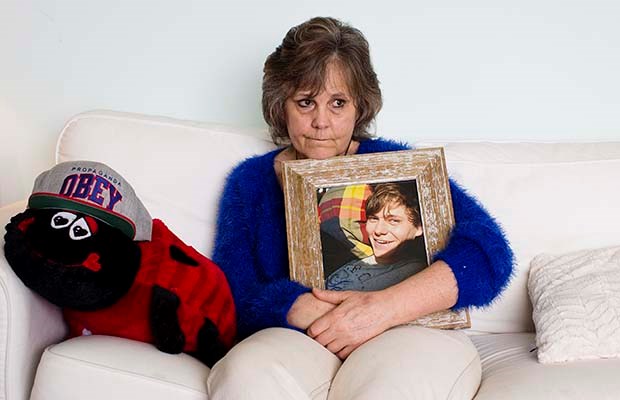Rhett Mutch’s troubles didn’t start Nov. 1, 2014, the day the 20-year-old died in a confrontation with Victoria police in his mother’s Dallas Road home.
That was just the culmination of 10 years of struggle, of his mother Marney Mutch desperately, futilely turning to the system for a solution she could not find on her own.
It was always just the two of them. Rhett’s dad was never in the picture and Marney had no family in Victoria, no support network.
Rhett’s behaviour became worrisome around age 10. He would have rages, turn destructive, threaten to break windows to get his mother evicted.
“It was like some other spirit entered my son,” Marney says. “It was frightening.”
A five-week stay at Ledger House, the children’s psychiatric care centre, didn’t produce a clear diagnosis, though she suspects Rhett’s problems were rooted in his feelings of being rejected by his father and, later, by a couple of men in Marney’s life. “You are a waste of your mother’s energy,” one told him.
“The hardest part of being Rhett’s mother,” Marney says, “was knowing there was something going on that I couldn’t figure out, and I couldn’t fix it.”
Nor, it seemed, could anyone else. “A lot of different resources were used.” A lot of things didn’t work.
Approaching social services for help backfired on Marney, triggering a chain of events that ended up with Rhett being placed in foster care, on and off, from age 11 to 16. At one point in his early teens, he became suicidal.
At 16, they got the foster-care order overturned. “He came back to me but it was fraught with problems.” The destructiveness continued. He was abusive toward her both verbally and, occasionally, physically — “often enough that it wasn’t easy to live with.”
She is anxious not to paint Rhett as a monster. He wasn’t. “He was funny, smart, hilarious.”
“It wasn’t all hell. I had so much fun with him, too. We were like Frick and Frack when we got going.”
But he was troubled. “It was like a Jekyll and Hyde thing. He was like two different people.”
A year before he died, Marney had Rhett charged with mischief after he broke a computer. “Can you imagine what it’s like to take your child to court? It’s excruciating. They think you’re the worst mother in the world.”
She didn’t want him punished, just forced to get the help he refused to accept voluntarily. “He needed counselling for trauma, but you can’t tell a kid that.”
Sure enough, the court ordered the counselling, but also added conditions that he have no contact with Marney and stay away from her house without permission. She didn’t see him for four months.
It took six months to get Rhett into that court-ordered counselling, she says, and when he said he couldn’t afford the $30-a-week fee, he was told his case would go to a student, and his interest waned.
That followed an earlier order to get counselling, one that faltered because there was no way to force him to take part in the sessions.
To Marney, that was typical of what would happen when she sought help from officialdom. There was always a gap between what the system promised and what it delivered. “It’s lipstick and rouge.”
Four months before his death, Rhett moved back in to her house, both mother and son ignoring the no-contact order. It still wasn’t easy. Rhett had developed a major pot problem that she says was robbing him of his dreams.
They would clash. “My son loved me more than anything, and I loved him more than anything,” she says, but the system that was supposed to help them served instead to fracture their relationship, creating resentments. “We were broken.”
A few days before Rhett died, they got into a dispute over something trivial — he had used some of his rent money to make a court-ordered payment — and he stormed out. Then, after he was fired from his job at McDonald’s on Halloween, he texted to say he wanted to move back. Marney wanted to see a path forward first. “I wasn’t ready for him to come home without a game plan.”
Rhett kicked in a window and broke in, which is when Marney called the police. She said she hoped that would trigger a process that would push the authorities to get him into treatment. “I didn’t know what else to do to get somebody to do their job.”
Instead, Rhett died. A report released Wednesday details what happened that day — but not the heartbreak and frustrations of the previous 10 years.
“It’s the powerlessness,” Marney says, “the futility of everything you do.”



